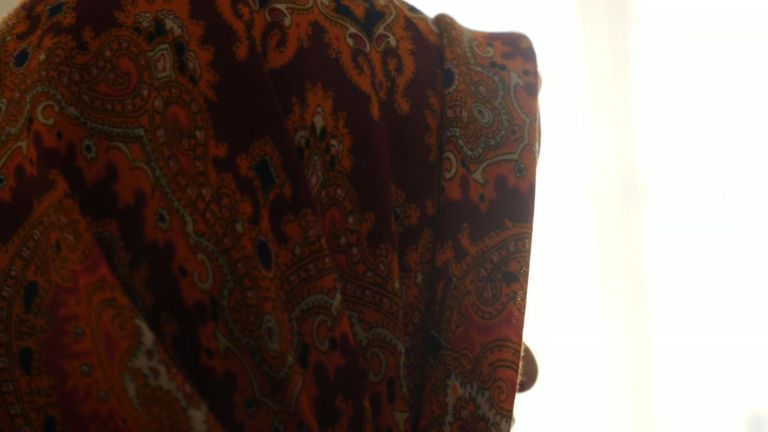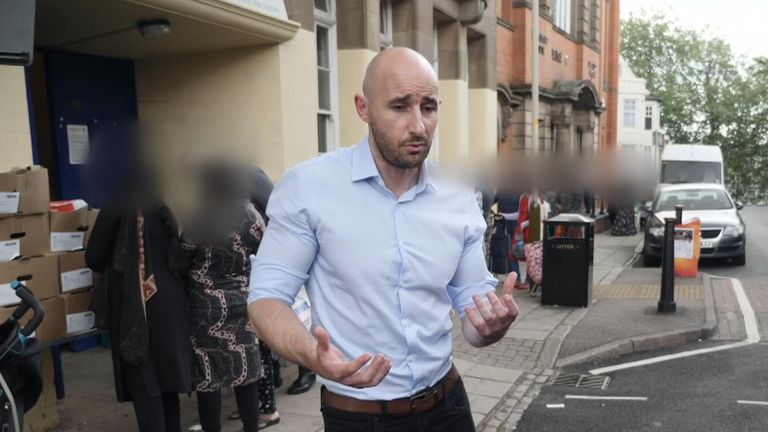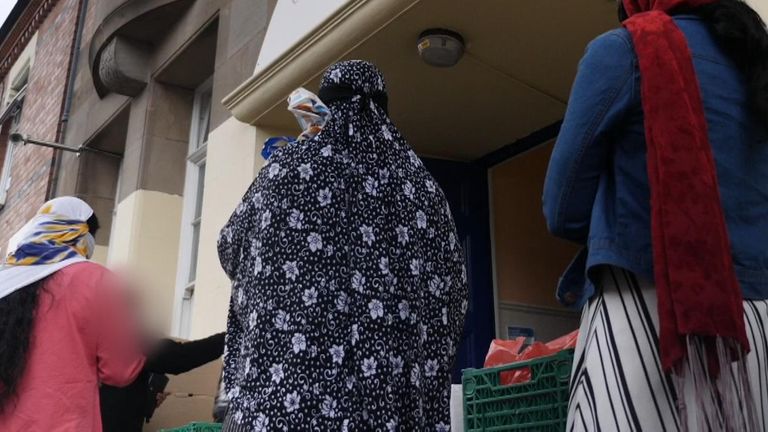How workers are still being exploited in Leicester’s textile industry
Workers are still being exploited in Leicester’s textile industry, according to new evidence seen by Sky News.
The anti-slavery charity Hope of Justice says the audit and enforcement approach to clamping down on workforce exploitation is not working “because factory bosses are getting really creative and innovative” in how they hide it.
Since last summer’s claims that some workers in the factories were being paid as little as £3.50 an hour, a joint investigation by government agencies, police and the council has led to inspections of almost 300 factories.
Boohoo, a major buyer from the Leicester factories, launched its own independent investigation.
Earlier this year, it cut ties with a number of manufacturers it said were unable to demonstrate the high standard of transparency required.
In May, it updated a list of suppliers it would continue to work with. The list includes more than 50 factories in Leicester.
Now, a worker at one of the approved factories claims her boss has found a new way to avoid paying staff the legal minimum wage of £8.91 per hour.
The woman, who we are not naming because she is afraid of the consequences of speaking out, showed us her payslips.
They detail the correct number of hours worked and show she was paid the minimum wage.
She also showed us the slip of paper she is given with each payslip with a handwritten number – and tells us that is the amount her boss says she has to withdraw in cash and return to the factory.
So far she has repaid hundreds of pounds.
“They say that you have to give this money back,” she says.
“They said, you know, ‘I can’t give you minimum wage, I can’t afford to pay you minimum wage because prices are very low in our product.’
“I’m worrying that if they find out that I’m not giving money back they might sack me.”
“It’s very stressing, you can’t even sleep, and you keep thinking that they’re taking so much money back from you,” her husband says.
There is no suggestion Boohoo know about this practice.
The couple say before Boohoo inspected the factory she was earning £5.50 an hour and this new system began after Boohoo insisted that staff were paid the minimum wage.
Anti-slavery charity Hope for Justice has been working within communities in Leicester to try to understand what is going on.
Paul McAnulty from the charity has spent time at a food bank where hundreds queue three times a week to get food for their families. Many of them are factory workers.
“We know from speaking to people here who are reliant upon the food bank, who aren’t being paid a fair wage, that there are methods in place where they have to pay that money back to the employer, where they’ve been given multiple workers cards so that not all their hours appear on their payslips,” he said.
“So we know that the audit approach, the enforcement approach, it hasn’t really given us any results in identifying evidence of slavery because factory owners are getting really creative and innovative in how they deal with that and how they hide it.”
Last summer a multi-agency investigation, called Operation Tacit, was launched into the textile industry in Leicester.
The operation involves police, HMRC, the Department for Work and Pensions and the Health and Safety Executive among others and has so far inspected almost 300 textile factories in Leicester.
Between July 2020 and January 2021, HMRC opened 110 new cases into Leicester textile business that remain ongoing.
Daniel Scully, from the Gangmasters and Labour Abuse Authority, who leads Operation Tacit, says the main challenge is encouraging workers to speak out.
“We really need people to reach out through one of the confidential routes to just help us understand if we’ve still got those sorts of problems going on because that’s not acceptable, none of the brands would find that acceptable and we don’t find that acceptable,” he said.
“I think there’s a fear of getting involved with the authorities. I think people are perhaps genuinely worried that by sharing information the factory that they work in will be shut down the next day.
“It may be through no fault of their own they’ve become part of a difficult process where they’ve perhaps been told to return money and they feel somehow involved in criminality now.
“What we say to anyone is that the most important thing is that you are being treated fairly and equitably and if you are being exploited that is our first concern.”
A man who wanted to be known only as Bashir is an agent for a building in the city that is leased out to several factory owners.
He says fast fashion is to blame, not the factory owners.
“These guys are squeezing and squeezing them all the time,” he said.
“Giving them pennies per garment and they sell for £30-£40 items they bought for £2-3. That’s really unfair.”
A Boohoo Group plc spokesperson said: “As part of our commitment to transparency, we published our list of approved UK manufacturers on 25 March 2021.
“We continually monitor our suppliers and have updated the list twice since initial publication, removing some suppliers who have failed to demonstrate the high standards required and also adding new ones.
“The rights of garment workers are central to our Agenda for Change programme. We require all of our suppliers to display the details of our UK whistle-blower helpline and we ensure that every concern raised is thoroughly investigated.
“In addition to the auditing work that we continue to do with suppliers every day in Leicester, we are transitioning all of our suppliers to Fast Forward, widely recognised as the leading auditing model in the UK.
“As part of our broader commitment to Leicester, we are investing £1 million in a Garment and Textile Workers Community Trust to fund outreach and advocacy programmes and will also be opening a manufacturing facility of our own, which will be operational before the end of the year.”




